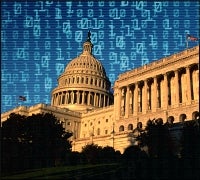 |
As the Obama team makes the rounds on Capitol Hill to promote the president-elect’s economic recovery plan, lawmakers are looking to spur broadband deployment with the massive stimulus bill they hope to pass next month.
Obama has already signaled his intention to include broadband provisions in the American Recovery and Reinvestment Plan, which includes a variety of tax cuts and government spending initiatives for a total price tag of about $775 billion. Obama said the effort would ultimately create between 3 million and 4 million jobs by 2010. A major component of the plan involves government investment in the nation’s infrastructure, both traditional and digital.
“We’ll put nearly 400,000 people to work by repairing our infrastructure — our crumbling roads, bridges and schools,” Obama said on Saturday in his weekly radio address. “And we’ll build the new infrastructure we need to succeed in this new century, investing in science and technology, and laying down miles of new broadband lines so that businesses across our nation can compete with their counterparts around the world.”
The broadband stimulus proposals come amid growing concern that the United States is falling behind its foreign competitors in broadband deployment, with one recent study showing that the nation has fallen from fourth place in 2001 to 15th in connection speeds.
“The overall reality is that America has become an international laggard in broadband,” Sen. Amy Klobuchar, D-Minn., said in floor remarks last week. “President-elect Obama understands that broadband must be considered a basic part of our national infrastructure.”
Klobuchar cited a recent study from the Brookings Institution that estimated that each percentage point increase in broadband adoption would lead to the creation of nearly 300,000 jobs.
Rep. Anna Eshoo, a California Democrat representing Silicon Valley, said that broadband provisions would be among the least controversial elements of the stimulus package.
“I don’t think that there’s any debate really as to whether it should or shouldn’t be included in the stimulus,” Eshoo said in an interview with InternetNews.com. “I think broadband is something that’s bipartisan. This is clearly a win.”
Anticipating a massive stimulus package in early 2009, Eshoo first pitched a series of proposals for spurring broadband deployment to Democratic House leaders in October.
“I thought it was important to get in early to make the stimulus a really forward-looking plan,” she said. “I believe that broadband is a way to achieve that.”
Eshoo called for tax credits that would allow Internet service providers to expense 100 percent of the costs of building out a next-generation network, which would entail speeds of 100 Mbps downstream and 20 Mbps upstream. She suggested a 50 percent expensing option for providers building “current-generation” networks in low-income and rural areas with speeds of 5 Mbps downstream and 1 Mbps upstream.
She also suggested that the government authorize broadband providers to issue low-interest bonds to finance their network build-outs, essentially providing them with “cheaper access to credit.” She finds historical precedent in the 1862 Pacific Railway Act, which authorized the issuance of bonds to finance the transcontinental railroad. Without stimulus, she warned, many providers would likely cut back on their build-out plans.
The details of Obama’s proposal are closely guarded, and remain fluid as his economic team meets with key legislators and their staffs this week.
“I haven’t seen anything concrete yet,” an aide to Sen. Olympia Snowe, R-Maine, told InternetNews.com, adding that a meeting with the Obama team was planned for this week. “Everything we’re still hearing is kind of abstract. I think there’s a good chance that there will be a broadband component in it. Our guess is that there will be some kind of provision for broadband in the stimulus.”
The tax incentives and grants for broadband expected to be included in the stimulus package are believed to total around $20 billion to $30 billion.
The Obama transition team did not immediately respond to a request for comment for this report.
One measure Snowe would like to see in the stimulus package is funding for the Broadband Data Improvement Act, which directs federal agencies such as the Census Bureau and the Federal Communications Commission to improve the quality of data they have about the deployment of broadband services. The bill was signed into law in October, but has yet to garner funding.
Several industry and consumer groups, including the trade association representing the cable and telecom industry, have also called for funding the bill through the stimulus bill.
As to the political prospects for broadband provisions, Snowe’s staffer is less optimistic than Eshoo, noting the skittishness among some lawmakers about more government spending as they consider an Obama plan that would bring the price tag for the government’s effort to steady the economy close to $2 trillion.
“With the deficit where it is right now, that’s certainly turned some heads,” the aide said. “Broadband’s tricky because it’s almost like an intangible in terms of how you can convey the importance of it. With broadband it’s a little different. I think there is a desire to quantify it a little better.”
Snowe, who sits on the Senate Energy and Commerce Committee, has long been an advocate of Internet issues, including Net neutrality, cyber security and rural connectivity. She firmly believes that increased broadband deployment would create jobs, but her aide said that many lawmakers are still looking for “better data points.”


